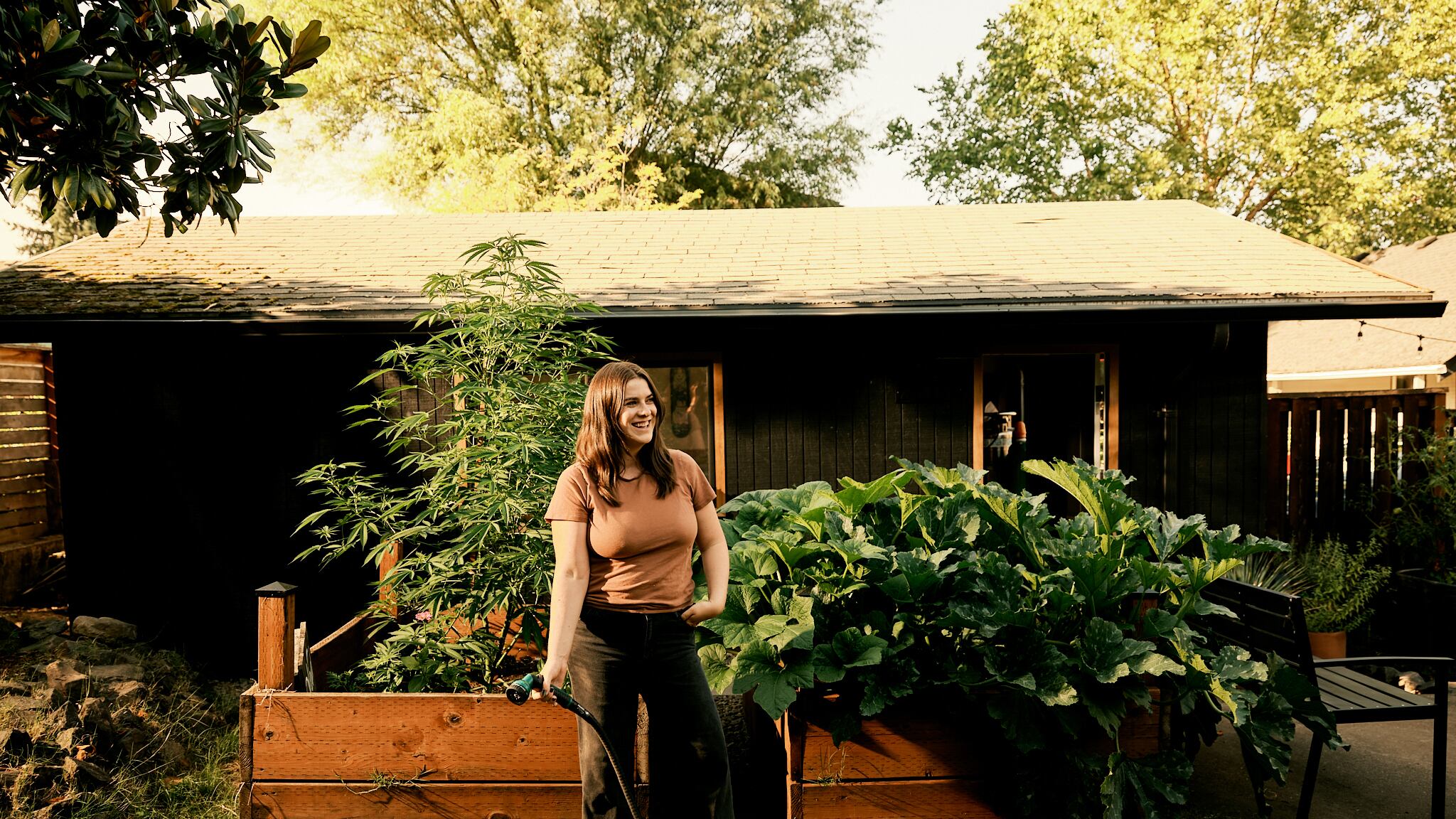Close your eyes and picture a weed smoker’s house. Are there tapestries on the wall? A copy of Paul’s Boutique whose gatefold cover bears the eternal residue of joint-rolling? A lamp converted to mood lighting by way of a scarf draped over the shade? This house is not that.
Jordon and Etai Rahmil are weed smokers: If they don’t tell you that themselves, the towering cannabis plant in their tidy backyard should clue you in. But their Piedmont home is a study in how interiors can gesture to a weedy lifestyle without taking things one toke over the line. Suffused with natural light, the house’s organic flow and warm palette of ochres, terra cottas, and olives align in a calming space for a family that is, in every sense of the word, growing.
“We always joke that weed has paid the bills for a long time,” Etai says. The couple met at a pipe shop in Eugene when Jordon was a student at the University of Oregon and Etai had discovered a passion for glassblowing at the university’s Craft Center. These days, Jordon is the director of public relations for the cannabis chain Curaleaf; Etai is the creator of intricate, functional glass pipes prized by collectors, and the CEO and founder of Pure Over, an all-glass pour-over coffee maker that uses pipemaking principles for brewing a perfect cup.
After four years living in Oakland, Calif., they moved north in 2015. “We were open-house people even before we were ready to buy,” Etai says. And they were ready to buy almost as soon as they walked into the house. “We looked at four homes, and this was the first one,” he recalls. “We were a little worried—like, is it weird to buy the first house you see?” But the roomy downstairs layout, quiet backyard, and garage big enough to house his glass studio, he says, “just checked all the boxes for us.”
0 of 10
The house was also in good enough shape that their renovation projects were chiefly cosmetic, including painting the exterior a dramatic deep green with near-black trim. The biggest undertaking involved the kitchen, where dated oak cabinetry and heavy light fixtures made an otherwise open room feel cramped. Etai joined forces with Jordon’s brother, Dakota, to create the room’s feature wall using the Japanese wood-preserving method shou sugi ban, which required them to burn each cedar plank one by one; they also crafted floating shelves from locally sourced wal- nut. With a baby on the way, the couple called on a contractor pal to carve out a pocket-sized addition to the master bedroom from unused storage space beneath the eaves. It’s the perfect size for now–13-month-old Cozi, but they plan to add a dormer, bathroom, and second bedroom in the coming years.
The home’s details reflect the couple’s interest in supporting independent businesses and craftspeople, many of which they find via Instagram. New York ceramicist Virginia Sin’s Lunar Pendant lights curve over the kitchen island; the open shelving holds bowls and plates from Hood River’s Wolf Ceramics; a bentwood sculpture by Bay Area artist Katie Gong floats above the master bedroom’s upholstered headboard. “We like to create little moments around the house that make us feel good,” Jordon says, nodding to the liv- ing-room ceiling, where a sheen of gold paint draws warmth downward while also hiding the previous owner’s slapdash plasterwork. Works by anonymous West Coast street-art legend GATS abound both inside the house and in Etai’s workshop; a piece by Oakland muralist Troy Lovegates bears another artist’s tag.
“This house really helped us develop our style,” Etai says. “When you’re bouncing around from place to place”—he estimates eight separate moves over the course of the pair’s years together—”you don’t have the opportunity to put work into a place that’s yours. Moving here allowed us to give some attention to figuring out what our aesthetic is.”
And though they smoke less these days, have shifted to lower-THC strains, and downsized their plants from four to one, the Rahmils see themselves as part of a movement that updates and modernizes the vernacular of cannabis culture. “A lot of that started with Etai’s pipes—just rethinking what a pipe can be and what place it occupies in a house,” Jordon says, noting that his design-forward creations are often bought by people who rarely smoke at all.
“Before we had a baby, we would have had more pipes around the house, had our stash a little more visible, the way a bar cart might be in someone else’s house. Our whole lifestyle is different now,” Jordon says. “But [weed] is still here with us, whether or not it’s actually in our hands.”
JORDON AND ETAI RAHMIL’S PORTLAND TOP FIVE
- FOR PLANTS, FLOWERS, AND GIFTS > Colibri Flowers & Plants
- FOR COFFEE > Deadstock Coffee
- FOR FOOD AND DRINK > P’s & Q’s Market
- FOR THE OUTDOORS > Peninsula Park
- FOR CANNABIS STARTS > Archive Seed Bank
This story is part of Nester, Willamette Week’s annual home magazine. It is free and can be found all over Portland beginning Friday, Sept. 22, 2023. Find your free copy at one of the locations noted here, before they all get picked up! Or, order one through our store.










